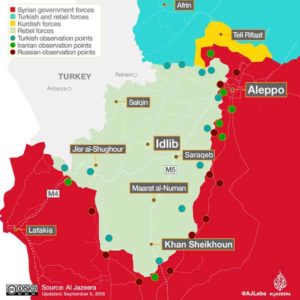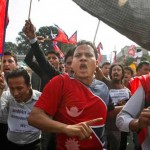Idlib is the capital city of the Idlib governorate which is among the 14 provinces of Syria, situated in the northwestern part of the country bordering Turkey and near the Mediterranean Sea. At its closest, it is 50kilometresfrom Bab Al-Hawa Border Crossing- an international border crossing between Syria and Turkey along the D8 27 Turkish highway. Although among the smallest provinces, Idlib, holds huge geostrategic significance for the countries that have a stake in the Syrian civil war. For Syrian President Bashar Al-Assad, a strong offensive in Idlib would eliminate the last remaining rebel stronghold and bring much of the country under the government control. For Turkey, the region holds great geostrategic significance as it sees it as a buffer area, positioned along the border with Syria, from where it can limit the flow of refugees into the country. Idlib also serves as a place from where Ankara can launch attacks against the Syrian Kurdish groups including the People’s Protection Units (YPG-which Turkey considers as a terrorist group). Turkey also has 12 military observation posts in Idlib province, which were set up as part of the three-way agreement with Russia and Iran under the Astana process in October 2017.
For Russia, Idlib does not represent immediate geostrategic gains as it does for Turkey and Syria. Moscow has been supporting the Assad regime in its plan to take back control over the country. It is important here to remember that, it is only after Russia intervened on an official request by the Syrian government in September 2015, that things began to turn in Assad’s favour. Russia has continued to support the Assad government since then and even in the case of Idlib, Moscow has provided air support to the Syrian ground forces in their offensive to defeat the rebels in the region. That said, it is not in Moscow’s interest to intensify air strikes in the region for the simple reason that it would antagonize Turkey, with which it is trying to normalize its relations.
Currently, US-Turkey relations are sour. President Erdogan has been critical of Washington support for the Kurdish groups in Syria.Turkey holds these groups responsible for terror attacks inside the country. Moreover, the refusal by the United States to handover Fethullah Gulen, the man whom Ankara accuses of masterminding the 2016 coup against the Turkish government has not gone down well. On the other hand, the Trump administration has reciprocated byincreasing tariffs on Turkish steel and aluminium following the detention of an American pastor Andrew Brunson. The US is also concerned about Turkey purchasing the Russian S-400 missile systems and in response has blocked the transfer of Lockheed Martin’s F-35 Joint Strike Fighter. All of this is happening at a time when the value of Lira has plummeted to its lowest against the dollar, raising concerns for President Erdogan to handle the economic situation at home.
This represents an opportunity for Russia, to mend ties with Turkey. From the geopolitics perspective, Russia would prefer strong relations with Turkey as it would help Moscow in stabilizing the Caucasus and also provide an edge in its relations with the West. Turkey is a NATO member country and a strong regional power in West Asia. For Moscow, having workable allies in West Asia is an important part of its strategy for the region. Russia has cemented itself as an important player in the region and good relations with Ankara are imperativefor establishing any kind of balance of power in the region. Given, the importance of the situation, Russia need not intensify air strikes in Idlib as an increased offensive would complicate the situationon ground and put strain on its relations with Turkey.
Currently, Idlib is controlled by several rival factions, among whom the strongest and the most dominant force is Hayat Tahrir al-Sham (HTS). HTS is a terrorist group, born as a result of the division between the terrorist group Ahrar al-Sham. The division was the result of the difference growing in Ahrar al-Sham where one faction, the pragmatist wanted to establish an Islamic party that could gain international legitimacy and the hardlinerswho wanted to establish the Islamic state an approach more akin to that of al-Qaida and Jabhat al Nusra. HTS is thus, the merger of the hardliners from al-Qaeda, Jabhat al-Nusra and several other rebel groups. Currently, HTS controls key locations across Idlib, including the provincial capital and the Bab al-Hawa border crossing with Turkey. The second commanding group is the National Liberation Front which is backed by Turkey. It is a rebel faction group wanting to counter HTS. The group comprises members of Ahrar al-Sham and the Nour al-Din al-Zinki Brigades, as well as others fighting under the banner of the Free Syrian Army.
Russia, Iran, Syria along with the United States and European countries consider HTS as a terrorist organization and want to eliminate it sooner than later. Turkey initially wanted to negotiate with the group and wanted HTS to join the National Liberation Front. A minimal understanding reached between HTS and Ankara last October allowed Turkey to address its principal objective in Idlib, i.e. containing a potential southward advance of PKK affiliated Kurdish fighters in the enclave of Afrin. However, since then Turkey has lost control over the group and HTS has rejected calls to join the National Liberation Front. Ankara in responsedeclared the group as a terrorist organization. The fall out of the negotiation between Turkey and HTS made two things clear, first Ankara was not in the commanding position to control or even influence the group’s activities and second, it could not stop the group from attacking the Assad forces, thereby warranting a regime response.
The problem for Turkey is that it wants to prevent its proxies from an onslaught by the Syrian forces. A regime offensive would also result in the new surge of Syrian refugees hitting Turkish borders. Currently, there are over 3.5 million registered Syrian refugees in Turkey. An offensive in Idlib will just increase the numbersand problems for Erdogan, who is trying hard to stabilize the economic situation in the country. A Turkish intelligence report has warned the government that as many as 250,000 Syrians may flee to Turkey from Idlib if Damascus launches a military operation into its northwestern province. In order to prevent any new intensification of the refugees, Turkey needs to influence event across the front separating the HTS dominated rebels and the Syrian regime. That would mean engaging in tactful negotiations. For Turkey to achieve its objectives, it would require striking a deal with Russia and the HTS leaders. The former would mean buying time till the latter is achieved.
In this regard, Turkey has reached a deal with Russia to agree for a demilitarized zone between militants and government troops in Idlib. Russia has agreed to put the offensive on hold, giving Turkey the much-needed time to form an understanding with the HTS leaders. However, it remains to be seen if Moscow will be able to convince the Assad regime to hold the offensive. Assad for all is keen on recapturing the whole country and would likely show little enthusiasm for a pause in the combat. For Turkey, the real challenge lies in negotiating with the HTS leaders and making sure that HTS dissidents and other militants in Idlib do not attack Turkish forces and forces of the Assad regime stationed in the region. It is not certain that the HTS forces would comply by this. However, an alternative for the HTS leaders is clear, a regime offensive would mean the loss of territorial control and probably the death of many of its fighters and leaders.
The situation in Idlib has come down to this. For the time being, Russia has agreed to stop airstrikes in Idlib, but it remains to be seen if Assad will comply with Russian orders. Turkey has got the much-needed time to strike a deal with the HTS leaders and other rival groups in the region. Turkey now needs to accelerate its efforts of either encourage shifts within the HTS by dividing factions loyal to al-Qaeda and those that may be willing to compromise or to work out plan to eliminate the group. The United States, till now has only provided tacit support to the Syrian opposition forces and Kurdish militias but could up the ante if the battle between the rebel forces and the Syrian government intensifies. For hundreds of thousands of people living in Idlib, the crisis may have been delayed for now, but a lot depends on how different powers in the region engage with one another.





